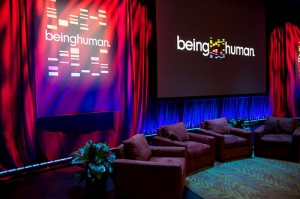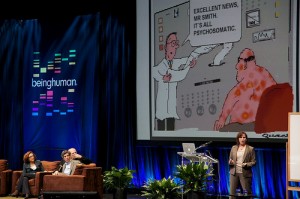On Health and Being Human — Part 2
 All day, we make decisions about our health. Consider two examples: What do you do with your afternoon break at work? And, how would you decide what treatments to pursue if you had a serious medical condition? We each probably have slightly different approaches to these questions.
All day, we make decisions about our health. Consider two examples: What do you do with your afternoon break at work? And, how would you decide what treatments to pursue if you had a serious medical condition? We each probably have slightly different approaches to these questions.
Health is one of the most fundamental aspects of being human. Lack of health can be, at best, a limiting factor to being active and productive. At worst, it is life threatening. Yet how do we, as humans, make the decisions we do about our health? The research presented at the Being Human conference this past Saturday shed light on how our perceptual and social experiences shape our decision-making process.
Neurobiological Conflict
Yes, neuro-bio-logical conflict: When you decide how to use your break time, there are various needs at stake. You might need to ease your emotional state, to satiate a craving, to fulfill social needs, or to expel energy. David Eagleman illustrated that in making decisions, various needs are battling for our attention within the wiring in our brains.
The need that wins your attention is not necessarily the one that will help you meet your long-term health goals. The weight of importance you place on long-term benefits of healthy behaviors in the moments at the beginning of your break will determine how often you go for a walk or choose water over soda as a snack.
Health in Society
Deciding on your break activity is somewhat trivial. Take a moment to consider more pressing and challenging health decisions
you might have to make. How would you go about deciding on a treatment if you found out you had a health challenge such as depression or heart disease? Most likely a doctor would greatly influence your decision, but then you would also consult your family members and other loved ones with their opinions on what they thought was best for your health.
Using the example of neurasthenia, Anne Harrington demonstrated a medical condition that no longer exists, and treatments for the condition we laugh at today. The list of symptoms that made up neurasthenia would now be considered chronic fatigue or depression. The difference however, was that neurasthenia was considered an actual medical condition in society.
If you would have talked to your doctor, or a friend about neurasthenia-like conditions in 1925, they would’ve suggested much different treatments than they would today. Not to say that neurasthenia was wrong, but societal contexts have changed to the extent that neurasthenia is irrelevant today. The aspect that persists is that it is still important for us to get support, advice and feedback from our social groups. Anne closed with a final statement that disease and healing must make sense to our culture, otherwise we risk not receiving the care that we need.
Practicality
To pull these examples into a more practical realm, we can improve the health decisions we make.
Technology has allowed us to connect with others in previously unfathomable ways. FoundHealth is just one of many ways we can readily connect with others that have experienced health challenges and faced treatment decisions like our own. We learn about health not only from the scientific evidence, but also others’ experiences. Both of these contribute to steering us toward the treatments that are right for us.
It is apparent from writing this article that there are many more conversations we could have on health and being human. It is a far more extensive topic than can be summed up in one event or article. Yet, upon leaving this article you continue being human. I encourage you share with us your health experiences in order to continually guide others toward making healthy decisions.
Join Our Community
Archives
- January 2023
- December 2022
- September 2022
- August 2022
- June 2022
- May 2022
- April 2022
- March 2022
- February 2022
- January 2022
- December 2021
- November 2021
- October 2021
- September 2021
- August 2021
- July 2021
- June 2021
- May 2021
- March 2021
- September 2020
- August 2020
- July 2020
- June 2020
- May 2020
- April 2020
- March 2020
- February 2020
Subscribe

Sign up to receive FREE toolkit
From Dr. Hyman, #1 NY Times & Amazon Author
We never spam or sell your e-mail




Follow Our Every Move